- Home
- Kami Garcia
The X-Files Origins--Agent of Chaos
The X-Files Origins--Agent of Chaos Read online
Begin Reading
Table of Contents
About the Author
Copyright Page
Thank you for buying this
St. Martin’s Press ebook.
To receive special offers, bonus content,
and info on new releases and other great reads,
sign up for our newsletters.
Or visit us online at
us.macmillan.com/newslettersignup
For email updates on the author, click here.
The author and publisher have provided this e-book to you for your personal use only. You may not make this e-book publicly available in any way. Copyright infringement is against the law. If you believe the copy of this e-book you are reading infringes on the author’s copyright, please notify the publisher at: us.macmillanusa.com/piracy.
For Stella, Nick, and Alex I hope you never stop believing.
For Erin Stein and Derek Racca You’re true believers. Leave a trail of sunflower seeds for the rest of us to follow.
We work in the dark. We do what we can to battle the evil that would otherwise destroy us. But if a man’s character is his fate, this fight is not a choice but a calling. Yet sometimes the weight of this burden causes us to falter, breaching the fragile fortress of our mind, allowing the monsters without to turn within. We are left alone staring into the abyss, into the laughing face of madness.
—Fox Mulder, The X-Files
CHAPTER 1
Washington, DC
March 30, 1979, 3:32 P.M.
Packs of teenagers, pumped for the official start of spring break, rushed past the black sedan parked across from the high school, unaware they were being watched from behind the car’s tinted windows. Jocks wearing Wilson High jerseys carried pretty cheerleaders on their shoulders, enjoying the chance to finally touch some thigh. Other guys horsed around in the road, showing off for girls in tight jeans who pretended not to notice them.
Most of the teens didn’t give the car a second glance. Black vehicles with tinted windows were as common as pigeons in Washington, DC—home base of the Secret Service, the CIA, and the FBI.
The man in the passenger seat scanned the face of every boy jaywalking across the road, searching for one in particular. “No sign of him yet,” he said, directing his comment at the older man behind the wheel.
“A powerful observation, Reginald,” his boss deadpanned. He sounded like somebody’s grandfather, and next to Reggie, he looked like one.
Reggie’s dark brown skin was as smooth as a newborn baby’s, and the short Afro tucked under his tweed newsboy cap only added to his boyish good looks. His bushy black mustache and sophisticated style—like the fitted white shirt, tan suede blazer, and flared black slacks he had on today—kept him from being mistaken for a college kid.
Even if the boss ditched the starched shirt, wide tie, and conservative side part, he couldn’t hide the lines etched into his pale skin like scars, or the worn look behind his cold eyes.
Reggie turned his attention back to the teens. They were still running on adrenaline and the illusion of freedom that youth offered. He watched them with a pang of envy. “It’s like they think nothing can touch them. Remember how that felt?”
“No. I was never an idiot.” The boss tapped his thumb against the steering wheel without disturbing the funnel of ash on the end of the cigarette in his hand. “People see what they want to see, which is generally nothing important.”
So much for small talk, Reggie thought as he continued to search the horde of kids. “There’s no way we could’ve missed him.”
“Your powers of deduction never disappoint me.” The boss took a drag from the Morley and exhaled slowly.
The cloud of smoke made Reggie’s eyes water, but he ignored it and focused on the funnel of ash, waiting for it to break off.
“The prodigal son appears.” The boss pointed his cigarette across the street at two boys walking down the sidewalk with backpacks slung over their shoulders.
Fox Mulder was a handsome kid—lean like a swimmer, with a look that was the perfect balance between clean-cut and I-don’t-give-a-crap. His dark brown hair hit just past the collar of his striped shirt, and the front was long enough to cover his eyes a little. Girls ate up that kind of thing. Fox stared into space as he shuffled along, holding a crumpled piece of paper.
The other boy was a different story. He was shorter than Fox by a foot, and the kid’s straight blond hair hung in his face, as if he was growing out a bad bowl haircut. His dirt-brown T-shirt featured a faded image of a scene from Star Wars, and his jeans were so long that the frayed bottoms dragged on the sidewalk.
The kid was talking nonstop, gesturing wildly and buzzing around Fox like a housefly. From the look of it, he could use a strip of duct tape to cover his mouth.
Reggie wasn’t a fan of talkers. They were a liability. “Who’s the kid with Bill Mulder’s son?”
“Are you familiar with the concept of research?” The boss finally tapped the cigarette against the edge of the ashtray, and the ash broke off in one piece, as if on command. He crushed the butt and focused his watery-blue eyes on Reggie. “Let me enlighten you. It’s a practice professionals use to obtain information so we don’t have to rely on assumptions.”
Reggie was tempted to fire back with a smart remark of his own, but the boss would make him regret it later. The organization they worked for was built on the backs of men and women with ice running through their veins—individuals willing to do whatever needed to be done, regardless of the cost—and the smoking man next to him was one of them.
“What’s my assignment?” Reggie wanted to get down to business. “Do you want me to collect Bill’s son?”
Collect sounded more civilized than abduct.
“Taking Samantha Mulder was partly insurance to keep her father from talking.” The boss opened a new pack of cigarettes and flicked his wrist, freeing one from the box. “And we all had to make sacrifices. But it would break Bill if we took his son, too, and right now we need him. The Project is at a critical stage that requires people with specific skills, and Bill Mulder is one of them.”
He lit the Morley and continued talking, with the cigarette tucked in the corner of his mouth. “So we have to keep an eye on Bill and his son. Follow the boy around and let me know if he does anything interesting. We’re also assessing Fox for potential recruitment.”
Tailing a teenager during spring break was a crap job, but Reggie wasn’t high enough in the food chain yet to complain about it. Instead he asked, “Who the hell names their kid Fox? His parents must hate him.”
“Bill and Teena are too busy hating each other. They were barely speaking when Bill moved out of the house in the fall.” The boss stared out the window, tracking Fox Mulder’s progress down the street. “The timing was perfect, actually. We stepped in and relocated Bill from Martha’s Vineyard to DC so he could work on the Project full-time. Fox came with him.”
“I’m surprised the kid’s mom let him go,” Reggie said. “My aunt and uncle divorced when I was young, and they butted heads about everything.”
“If I gave you the impression that I want to swap childhood memories, let me clarify. I don’t.” He took a long drag from his cigarette, and a new funnel of ash began to form. “Interestingly enough, sending Fox to live with his dad was Teena’s idea.”
“Doesn’t that seem strange?” Reggie asked, ignoring the insult.
“It does.” The boss exhaled, and a ribbon of smoke curled its way toward Reggie, who finally coughed and reached for the window handle. The boss snapped his fingers and pointed at the glass. “It stays up.”
Reggie ignored the burning sensation in his
throat. He refused to appear weak in front of a man who had once referred to weakness as a disease during a debriefing. “Do you think Fox’s mom knows something?”
“The jury is still out. But when the verdict comes in, I’ll deal with Teena Mulder personally.” Another trail of smoke snaked from the boss’s chapped lips. “You focus on Fox. Update me directly—and only me.”
“So no reports?”
“Keep them to a minimum. We don’t want to leave any bread crumbs. So from this point on, you no longer have a name.
“Sign your reports as ‘X.’”
CHAPTER 2
Woodrow Wilson High School
3:47 P.M.
Fox Mulder stared at the C written at the top of his history test as he walked down the sidewalk with Gimble. His friend hadn’t stopped talking since the bell rang at the end of sixth period, officially signaling the beginning of spring break. That was the thing about Gimble—nothing fazed the guy. He would never waste his time worrying about one lousy grade, but Mulder couldn’t let it go.
After three tests that had all followed the same format—thirty multiple-choice questions taken directly from the textbook and twenty short-answer questions—their history teacher had thrown the class a curveball and switched to essay questions.
“I don’t get it.” Gimble glanced at Mulder’s paper. “Didn’t you read the chapters?”
“Yeah.”
“Then what gives?” Gimble asked. “With that superpower of yours, you should’ve aced the test.”
“A photographic memory isn’t a superpower. It’s an anomaly.” And a social curse, Mulder thought.
The fact that Mulder could remember every word he read annoyed people at school—his classmates, because even if they spent days studying for a test, Mulder would still score higher; and his teachers, because they hated the fact that he knew more than they did.
So Mulder didn’t tell anyone about his memory if he could avoid it. But it was hard to hide from Gimble once they became friends. After Mulder quoted whole pages from Starlog magazine, word for word, he gave himself away.
But his photographic memory couldn’t have helped him today. Mulder crumpled up the test and stuffed it in the back pocket of his jeans.
Gimble noticed and seemed to take it as a sign that Mulder was stressed about his grade. “Maybe it was just an off day and your circuitry got crossed?”
“I don’t have off days.” At least not because of my memory, Mulder thought. “That’s not the way it works. I remember everything from the reading.”
“Then how did you end up with a C?”
“American history textbooks are biased,” Mulder said. “Lots of information in them is inaccurate.”
Gimble smacked a palm against his forehead. “Dude? Tell me you didn’t write that on the test?”
“When did the delegates of the Continental Congress sign the Declaration of Independence?” Mulder asked without missing a beat. “Give me a date.”
“This is obviously a trick question.” Gimble frowned, concentrating. “We’re talking about the Declaration of Independence—the one signed by fifty-six men, with John Hancock’s famous signature on it?”
“That’s the one.”
“Easy. July fourth, 1776,” Gimble said confidently.
“Don’t try out for Jeopardy! anytime soon, because you are incorrect,” Mulder said. “The Continental Congress voted for independence on July second. July fourth is the date the Declaration was adopted by the Congress and signed by John Hancock.”
“How is that any different from what I said? You asked when the delegates signed, not when they voted.”
Mulder nodded. “True. But Hancock was the only delegate who signed on July fourth.”
“Now you’re just messing with me.” Gimble wasn’t buying it. “I’ve seen the real Declaration of Independence, at the National Archives. The bottom is covered with signatures.”
“Fifty-six,” Mulder said. “And most of them signed on August second. Look it up—just not in our history textbook.”
Gimble scratched his head. “Our book sucks. I get it. But why didn’t you just write down whatever it says and walk away with an A?”
Mulder shrugged. “Because the information is wrong.”
“Who cares?”
I do.
Mulder was sick of people feeding him lies. He had to choke them down at home, but he refused to do it at school, too.
“Will your dad be pissed about your grade?” Gimble asked.
Mulder snorted. “He doesn’t even know I had a test.”
“You’re lucky. The Major is always asking me questions. I wouldn’t be surprised if he had a copy of the class syllabus.”
He’d never met Gimble’s dad, but from what his friend had told him, the man sounded intense. Most fathers wouldn’t make their sons call them “the Major.”
“Your dad can’t be that bad,” Mulder said. “Not many people have a wide-field reflecting telescope at home.”
Gimble grinned. “Okay … the telescope is pretty rad. A friend of the Major’s from the air force got ahold of it for him. It’s nothing like the amateur-grade models they sell in stores.”
“Seriously? I had no idea.” Mulder laid on the sarcasm. “I’m completely unfamiliar with Newtonian infinite-axis telescopes.”
“Show-off.”
Mulder laughed. “It would be nice to put my insomnia to good use and get an asteroid or Martian crater named after me like George Hale. Are you sure your dad won’t mind if I try it out?”
“I told you he said it was cool.” Gimble flicked his head to the side just enough to get the long hair out of his eyes—something he did at least fifty times a day. “Let’s go see a guy about a telescope.”
Mulder picked up his pace. As a kid, he’d wanted to be an astronaut when he grew up. He was ten years old when his dad told him that it would never happen. Astronauts had to pass a vision test, and Mulder had protanopia—a type of red-green colorblindness. Most people thought it meant that he couldn’t distinguish between red and green, but protanopia only affected his ability to see red. One color. That was all it took to crush Mulder’s dream.
“There’s a bunch of other stuff I want to show you, too.” Gimble scrambled ahead and turned around to walk backward, facing Mulder. “I’ve got forty-eight Star Trek cards, not including doubles. No one counts doubles, you know? And I have the Dr. ‘Bones’ McCoy card that came out three years ago, in mint condition.”
“That’s cool.” Mulder was used to epic levels of Star Trek devotion. Phoebe, his best friend back home in Martha’s Vineyard, collected the trading cards, too, along with everything else related to the TV show or the movie.
“I’ve got something even cooler.” Gimble stumbled on a crack in the pavement but managed to catch himself. “Well, maybe not cooler, but almost as cool. Or equally as cool,” he said, as if the Star Trek gods had tripped him for making the comment.
“Like what?”
Gimble turned onto a residential street lined with brownstones. Instead of answering the question, he stopped in front of the second house. “This is it.”
“I hope you have good junk food.” Mulder followed his friend up the steps. “All we have at my dad’s is sunflower seeds.”
Gimble hesitated at the door. “The Major is kind of strange. I told you that, right?”
“At least a hundred times,” Mulder said. “Including thirty seconds ago. Whose dad isn’t?”
“‘Kind of’ is probably an understatement. And all the news reports about that missing kid are making him worse.”
Billy Christian—that was the little boy’s name.
For a moment, Mulder couldn’t catch his breath. It felt like someone was squeezing all the air out of his lungs, and then the feeling passed, like it always did. Gimble was still talking. “My mom’s death really screwed him up, you know?”
“I get it.” Mulder’s mother had never been the same after his younger sister, Samantha, disapp
eared almost five and a half years ago. Every night she would put on her apron and prepare one of her specialties—meat loaf or a casserole—in an attempt to make it feel as if their family wasn’t falling apart. She would sit at the kitchen table and read a magazine or clip coupons while she waited for the oven timer to go off. After the third time he found his mom staring into space, while the oven timer buzzed and a casserole burned to a crisp in the oven ten feet away from her, Mulder learned to listen for the buzzer.
One night, he made the mistake of taking a shower before it went off. By the time he made it to the kitchen, the alarm was blaring and a veil of black smoke had filled the kitchen. His mom sat in the midst of it all, her cheeks smudged with tears.
Mulder swallowed hard and pushed away the memory. “Are we going inside or what?”
“I guess.” Gimble took out his keys and unlocked the five dead bolts on the door.
Mulder followed him inside, but he stopped cold just past the front hallway. It opened up into what Mulder assumed was supposed to be the living room, but he wasn’t sure because every square inch of the space—except for a sofa, a recliner, and a small patch of shag carpet in the center—was covered with junk.
No wonder Gimble hadn’t invited him over before. Most people would’ve taken off the moment they walked in, but Mulder found his friend’s house oddly fascinating.
“The Major saves everything.” Gimble walked over to the television set and picked up a two-way radio sitting on top. He pressed the button on the side and spoke into it. “It’s me. I’m home.”
Static crackled through the speaker, followed by a man’s gravelly voice. “This is a secure line. Code words?”
Gimble rolled his eyes. “Agent of Chaos.”
The radio crackled again. “Meet me at the extraction point at sixteen hundred.”
“He means four o’clock,” Gimble explained to Mulder before signing off. “Got it. I’m out.” He returned the two-way radio to its original location on top of the TV set, his shoulders sagging. “Sorry. If I don’t ‘report in’ when I get home, the Major will think I’m an intruder.”

 Beautiful Creatures
Beautiful Creatures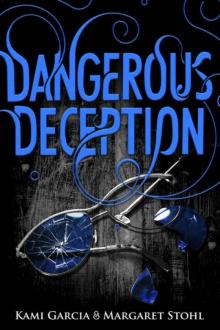 Dangerous Deception
Dangerous Deception Unmarked
Unmarked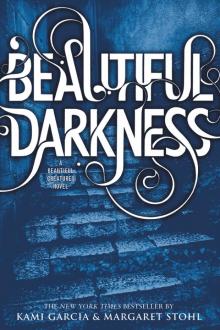 Beautiful Darkness
Beautiful Darkness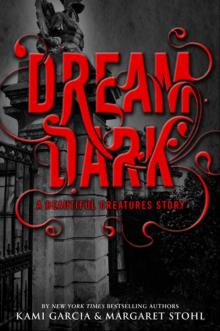 Dream Dark
Dream Dark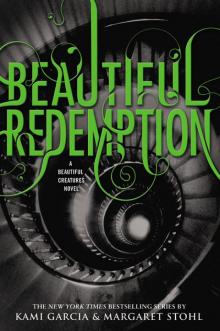 Beautiful Redemption
Beautiful Redemption Beautiful Chaos
Beautiful Chaos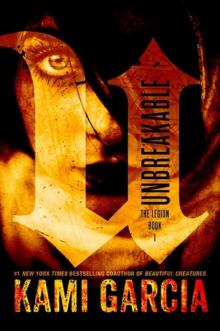 Unbreakable
Unbreakable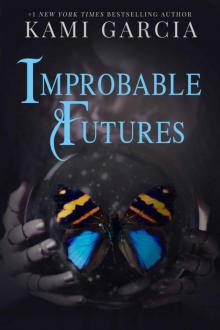 Improbable Futures
Improbable Futures Broken Beautiful Hearts
Broken Beautiful Hearts The Lovely Reckless
The Lovely Reckless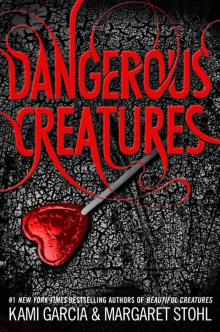 Dangerous Creatures
Dangerous Creatures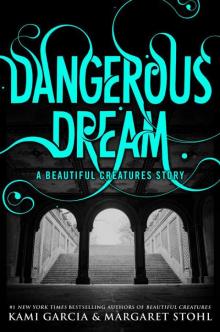 Dangerous Dream
Dangerous Dream The X-Files Origins--Agent of Chaos
The X-Files Origins--Agent of Chaos The Mortal Heart
The Mortal Heart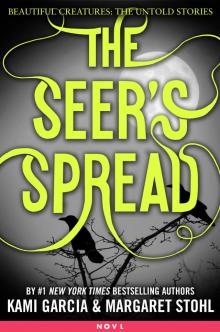 The Seer's Spread
The Seer's Spread A Gatlin Wedding
A Gatlin Wedding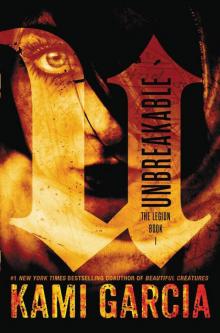 Unbreakable l-1
Unbreakable l-1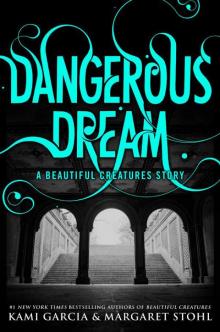 Dangerous Dream: A Beautiful Creatures Story
Dangerous Dream: A Beautiful Creatures Story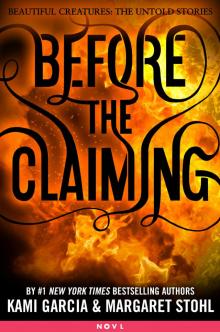 Before the Claiming
Before the Claiming